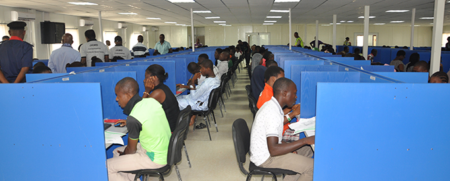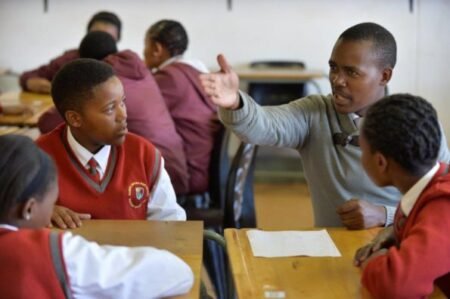Piano and Drums
by Gabriel Okara
The piano is a key
It sings a tune of love
Of joy, of happiness
It sings with a voice of velvet, soft and smooth,
With beauty that you never knew,
Like the moonlight on the lake,
Gentle and cool in the night.
But oh! The drums—
They are wild and free!
They beat with a passion fierce
That echoes in the heart of Africa.
Their voice is thunderous,
A rhythm that never stops,
A dance that shakes the earth
And moves the soul.
The piano calls me with its sweet song,
But the drums—
They pull me to my roots,
To the land of my forefathers,
Where the spirit of the earth beats loud.
The piano is sweet,
But the drums…
The drums are my blood,
My heart, my soul.
Gabriel Okara is one of Nigeria’s most celebrated poets, whose works often explore the themes of cultural identity, conflict, and the tension between tradition and modernity. His poem “Piano and Drums” is a reflective piece that delves into the struggle between African cultural heritage and Western influences. Through this powerful juxtaposition of two distinct sounds – the piano and the drums – Okara captures the essence of the internal conflict that many Africans face as they navigate between their traditional roots and the pull of colonial influences. In this educational guide, we will explore the major themes, literary devices, and activities that can help students understand the richness of “Piano and Drums”.
1. The Theme of Cultural Conflict
The most prominent theme in “Piano and Drums” is the tension between tradition and modernity. Okara uses the imagery of the piano, a symbol of Western culture, and the drums, representing African traditions, to explore the inner conflict of an individual who is torn between these two worlds. The poem reflects the challenge of reconciling the demands of modernity with the deep-rooted traditions of African heritage. Okara’s speaker is torn between the two sounds – one that evokes the calm and disciplined structure of Western life, and the other that calls forth the vibrant, passionate, and primal energy of African culture.
2. The Theme of Identity and Displacement
In “Piano and Drums”, Okara also addresses the theme of identity. The speaker in the poem is caught between two conflicting cultural identities: the European-influenced society, symbolized by the piano, and the traditional African culture, symbolized by the drums. This internal conflict reflects the sense of displacement that many Africans, particularly those living in post-colonial societies, feel. The individual is unsure of where they truly belong – whether in the world of European refinement and civility or in the world of African customs and primal rituals. This theme speaks to the larger issue of cultural displacement and the search for a coherent identity in a world that is rapidly changing.
3. The Influence of Western Colonialism
The presence of the piano, often associated with European culture and colonialism, suggests the profound impact of Western influence on African societies. The poem can be seen as a critique of colonialism and its lasting effects on African cultures. By contrasting the piano with the drums, Okara explores how colonialism has affected African self-perception and cultural practices. The introduction of Western ideas and customs has often led to the erosion of traditional African values, and the poem questions whether the adoption of these Western values is worth the loss of cultural heritage.
4. The Primal Nature of African Culture
While the piano represents the structured, controlled nature of Western society, the drums symbolize the raw, primal, and energetic aspects of African culture. In the poem, the drums evoke powerful emotions, such as freedom, expression, and vitality, which are essential elements of African traditions. The drums connect individuals to their heritage and to the ancestral past, resonating with the rhythms of life in African societies. Okara’s imagery emphasizes the vitality and strength of African culture, portraying it as something dynamic and deeply rooted in the land and people.
5. The Soundscape of the Poem
The duality of the piano and drums is not just a symbolic element but also a central motif in the poem’s soundscape. Okara contrasts the disciplined and serene sound of the piano with the thunderous, spontaneous beat of the drums. The juxtaposition of these two sounds represents the two conflicting cultural forces within the speaker’s mind. The piano’s melody is orderly and refined, while the drum’s beat is unrestrained and primal. This tension creates a vivid auditory imagery that draws attention to the emotional and psychological conflict of the speaker.
6. The Loss of Innocence and Connection to Roots
Another theme in “Piano and Drums” is the loss of innocence and the disconnection from one’s cultural roots. The speaker’s memory of the drums is nostalgic and filled with longing, as the drums symbolize a time of innocence and unity with the natural world. However, the piano represents the intrusion of modernity and the gradual separation from this traditional past. The poem’s shift from the drums to the piano suggests the painful process of losing touch with one’s heritage, a theme that many Africans can relate to in the context of colonialism and globalization.
7. The Role of Memory in Shaping Identity
Memory plays an important role in shaping the speaker’s identity in “Piano and Drums”. The speaker reflects on his childhood memories of the drums, which were once a central part of his life. However, as he matures and encounters the influence of the piano, these memories become overshadowed by the modern, Westernized world. The tension between memory and the present reflects the struggle to hold on to one’s cultural roots while adapting to the demands of modern life.
8. The Conflict of the Self
At a deeper level, “Piano and Drums” explores the internal conflict that arises when an individual is caught between two different cultural identities. The speaker’s conflict is symbolic of the broader post-colonial experience, where Africans must navigate the complexities of identity, tradition, and the effects of colonialism. The poem’s focus on this internal struggle mirrors the larger social and political tensions experienced in many African countries during the post-colonial period.
9. The Reconciliation of Tradition and Modernity
Despite the tension between the piano and the drums, “Piano and Drums” also hints at the possibility of reconciliation between tradition and modernity. The poem does not advocate for the abandonment of one culture in favor of the other, but rather suggests that both can coexist and complement each other. The speaker’s internal conflict can be seen as a metaphor for the broader societal need to find a balance between preserving cultural heritage and embracing the benefits of modernization.
10. The Universal Nature of Cultural Struggles
While “Piano and Drums” is rooted in the Nigerian and African experience, the themes of cultural conflict, identity crisis, and the impact of colonialism are universal. The poem speaks to anyone who has faced the challenge of balancing tradition and modernity, whether in an African, Asian, or Western context. Okara’s work resonates with individuals from diverse backgrounds who struggle to define themselves in the face of external cultural influences.
Class Activities
- Theme Discussion:
- Organize a class discussion on the themes of cultural conflict, identity, and the impact of colonialism in “Piano and Drums”. Ask students to relate these themes to their own experiences or to other works of literature that explore similar issues.
- Poetry Performance:
- Have students perform a reading of “Piano and Drums”, paying attention to the rhythm and sound of the piano and drums. Encourage students to embody the tension between these two symbols during their performance.
- Cultural Reflection Exercise:
- Ask students to write a short essay reflecting on their own cultural heritage. What traditions and values have shaped their identity? How do they relate to the themes of tradition and modernity in “Piano and Drums”?
- Debate on Tradition vs. Modernity:
- Organize a debate where one side argues in favor of preserving tradition, while the other side argues for embracing modernity. Use “Piano and Drums” as a starting point for discussion.
- Creative Project:
- Ask students to create a visual project (e.g., collage, drawing, or sculpture) that represents the tension between the piano and the drums. The project should reflect the theme of cultural conflict and identity.
Class Assignments
- Essay on Identity and Displacement:
- Write an essay exploring the theme of identity in “Piano and Drums”. Discuss how the speaker’s internal conflict between the piano and drums reflects the broader experience of displacement and cultural conflict.
- Poetry Analysis:
- Analyze the use of symbolism in “Piano and Drums”, focusing on the piano and drums as metaphors for cultural conflict. How do these symbols contribute to the poem’s central themes?
- Research Paper on Post-Colonial Identity:
- Research the impact of colonialism on African identity and culture. Write a paper discussing how “Piano and Drums” reflects the psychological and emotional effects of colonialism.
- Creative Writing:
- Write a poem inspired by “Piano and Drums”, exploring the theme of cultural conflict. Consider how you would express your own experience of balancing tradition and modernity.
- Comparative Analysis:
- Compare “Piano and Drums” with another African work of literature that deals with similar themes of tradition and modernity. How do the two works approach these themes differently?
Conclusion
Gabriel Okara’s “Piano and Drums” offers a powerful exploration of cultural conflict, identity, and the complexities of post-colonial life. Through the vivid imagery of the piano and drums, Okara captures the internal struggle faced by individuals caught between the pull of tradition and the influence of modernity. This poem provides a rich ground for discussion and analysis, and through its themes, it encourages readers to reflect on their own cultural heritage and the ongoing process of reconciliation between the past and the present.




